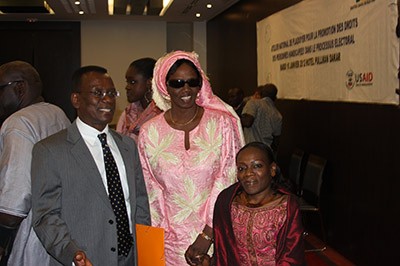
Senegal has a reputation of being one of the few stable democracies in West Africa. This perception was confirmed by the recent 2012 elections marked by the third peaceful transition of power from one president to the other – two of which took place following credible democratic elections. This trend in governance presents an excellent window of opportunity to address core challenges to the country’s progress on democratic and economic governance over the past decade. U.S. assistance supports decentralization and development at the local level, promoting government-wide transparency and accountability, institutionalizing electoral and political processes, and supporting social stability in the restive Casamance region.
GOVERNANCE AND PEACE PROGRAM (USAID/PGP)
This four-and-a-half-year project, scheduled to run through 2014, focuses on enhancing democracy, good governance and national reconciliation. The project’s objectives are to increase transparency and accountability; improve fiscal decentralization to local governments; increase civic participation in the electoral process; and support social stability in the Casamance. USAID/PGP supports efforts for increased fiscal decentralization following a leading role in promoting the free and credible 2012 elections through projects empowering civil society to widely observe the elections, supporting national elections bodies, and strengthening political party coalitions. The project addresses national reconciliation by supporting local communities and civil society in their efforts to resolve issues of social stability and local governance in the Casamance region.
WOMEN'S LEADERSHIP AND CIVIC JOURNALISM
The Women's Leadership and Civic Journalism project promotes women’s leadership at the community level by increasing the presence of women in local media in the Thiès and Diourbel regions. The project recently expanded following a successful pilot stage in collaboration with radio Guindiku FM, started by ARLS (a women’s organization). The program supports Guindiku FM, which reaches over 400,000 people over a 50-kilometer radius and is a vibrant source of information for local communities. Guindiku FM features programming on women’s issues, health, education, political participation, human rights, and entertainment. Programs are created and presented by women, feature interviews with women leaders and portray women in a way that encourages leadership roles in their communities. The second phase of the program will allow a greater depth of capacity building for women reporters, ARLS staff, radio staff, and Community Based Organization (CBO) members to help them more effectively advocate (through radio programming and community-based activities of listening groups) for increased roles for women in community decision-making while addressing the underlying barriers that often keep women from these roles.
DIALOGUE, COMMUNITY AND TRANS-BORDER RECONCILIATION (DIRECT)
This two-year peace-building project supports conflict mitigation and reconciliation in the Casamance region of Senegal along the border of Guinea-Bissau. The project is based on the people-to-people approach. It targets communities through dialogue, cultural exchanges, and mediation activities, which promote community reconciliation and local populations’ participation in the Casamance conflict resolution process.
STRENGTHENING COMMUNITY OPPORTUNITIES FOR PEACE AND EQUALITY (SCOPE)
The project helps communities inclusively resolve local natural resource conflicts, which can play a critical role in community cohesion in the Casamance, to improve their capacity to effectively participate in a Casamance peace process. The project will increase and enhance citizen participation – particularly marginalized groups such as women and youth – in identifying and addressing root causes of the conflict.
CAPACITY DEVELOPMENT PROJECT (PROCAP)
A follow-up to the successful elections observation project in 2012, PROCAP provides capacity-building assistance to help nonpartisan civil society organizations replicate and integrate the tools and technologies introduced in the earlier initiative. The program supports NGO-3D and its partner organizations within the Collectif des Organizations de la Societé pour les Elections that contributed to managing and implementing the observation program to enable USAID to better assist in managing future elections observation activities.
PARLIAMENTARIAN ASSISTANCE AND CIVIC ENGAGEMENT (PACE)
Thanks to the introduction of the new gender parity law, 46 percent of the legislators elected in the July 2012 legislative elections are women. While the parity law provides women with a unique opportunity to help reshape public opinion of their role in society, there is significant pressure for them to prove that they are capable of effectively leading, influencing public policy, and helping remove barriers to women’s electoral and political participation. USAID will support the strengthening of the National Assembly through a new 18-month project awarded to a local organization (NGO 3D) on behalf of a consortium of local and international organizations.
The project aims at promoting reforms that are conducive to sustainable democratic governance through capacity building for members of the National Assembly and better citizen participation in the decision-making processes, and law making and implementation. The project is divided in two components including legislative assistance through capacity building and logistic support, and civic engagement such as advocacy for political reforms, trainings on interaction with civic groups.







Comment
Make a general inquiry or suggest an improvement.